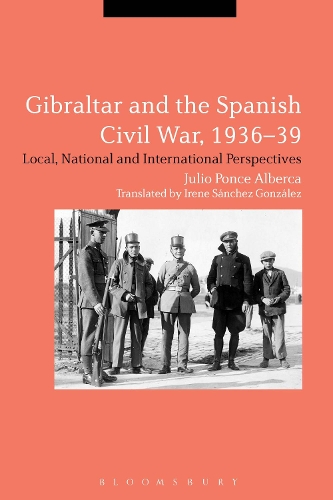
Gibraltar and the Spanish Civil War, 1936-39: Local, National and International Perspectives
(Paperback)
Available Formats
Publishing Details
Gibraltar and the Spanish Civil War, 1936-39: Local, National and International Perspectives
By (Author) Julio Ponce Alberca
Translated by Irene Snchez Gonzlez
Bloomsbury Publishing PLC
Bloomsbury Academic
1st June 2016
United Kingdom
Classifications
Tertiary Education
Non Fiction
Modern warfare
European history
946.89
Physical Properties
Paperback
208
Width 156mm, Height 234mm
304g
Description
Incorporating local, national and international dimensions of the conflict, Gibraltar and the Spanish Civil War, 1936-39 provides the first detailed account of the British enclave Gibraltar's role during and after the Spanish Civil War. The neutral stance adopted by democratic powers upon the outbreak of the Spanish Civil War is well-known. The Non-Intervention Committee played a key role in this strategy, with Great Britain a key player in what became known as the "London Committee". British interests in the Iberian Peninsula, however, meant that events in Spain were of crucial importance to the Foreign Office and the victory of the Popular Front in February, 1936 was deemed a potential threat that could drive the country towards instability. This book explores how British authorities in Gibraltar ostensibly initiated a formal policy of neutrality when the uprising took place, only for the Gibraltarian authorities to provide real support for the Nationalists under the surface. The book draws on a wealth of primary source material,some of it little-known before now, to deliver a significant contribution to our knowledge of the part played by democratic powers in the 1930s' confrontation between Communism and Fascism. It is essential reading for anyone seeking a complete understanding of the Spanish Civil War.
Reviews
[A] succinct study ... The author's prose is both clear and direct ... [This] work represents an accessible yet authoritative overview of a still neglected topic in the vast bibliography of the foreign dimensions of the Spanish Civil War. * European History Quarterly *
Alberca brings together for the first time archival resources from the UK, Spain and Gibraltar to produce a fascinating insight into the part played by Gibraltar in the Nationalist victory... This extensive study not only reveals much of the untold story of Gibraltar in the 1930s but also sheds fresh light on key events of the day such as the non-intervention agreements, British military preparations for the Second World War and the victory of General Franco in April 1939. * Chris Grocott, University of Leicester, UK *
Gibraltars historic, strategic importance to Britain and its empire has long been recognised. This impressive book highlights the crucial role that the Rock played in one of the twentieth centurys most bitter and divisive conflicts, the Spanish Civil War. It is sensitive not only to the diplomatic and strategic significance of Gibraltar for Britain and Spain (both Rebel and Republican), but to the profound and long-lasting effects of the conflict for civilians on both sides of the Gibraltar frontier. Deftly combining an impressive range of primary and secondary materials, local and national archives, Julio Ponce has fashioned an engaging and fascinating historical account. * Gareth Stockey, Lecturer in Spanish Studies, University of Nottingham, UK *
Ponce has given us a rich portrait of Gibraltars role in wartime Spain. Drawing on a range of sources, this book reveals the extent to which Britains Iberian colony influenced the course of the Spanish Civil War in political, military, diplomatic, social, and material terms. Ponce demonstrates how Gibraltars longtime practice of seeking good relations with neighboring districts of Spain became central to British policy toward Spain during the international crisis of the late 1930s. More than malevolent neutrality toward the Spanish Republic, Ponce demonstrates that British policy in fact amounted to active pro-Franco interventionism. Moving beyond the charged and misleading notion of appeasement, he makes the case that Gibraltars relations with Francos forces should be understood as part of the broader British strategy to foster good relations with European counter-revolutionaries in order to counterbalance the influence of the fascist powers. * Sasha D. Pack, Associate Professor of History, University at Buffalo, State University of New York, USA *
Author Bio
Julio Ponce Alberca is Lecturer in the Department of Contemporary History at the University of Seville, Spain. Irene Snchez Gonzlez is a freelance translator and editor.
